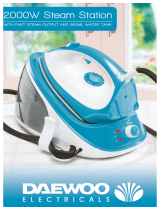
7
B O S C H
2
Preparations
1. Remove any label or protective
covering from the soleplate.
2. Place the appliance horizontally on a
solid, stable surface. You may remove
the iron pad from the appliance and
place the iron on it on another solid,
stable, horizontal surface.
3. Fill the water tank, making sure not
to pass the MAX level mark.
4. Unwind the mains cable (10) fully
and plug it into an earthed socket.
5. Set the main power button (8) to the
on position (illuminated in red)*.
6. The “Steam ready” indicator lamp
(4) will light up after several minutes,
indicating that the appliance is ready
to use.
The steam generator will take more
time to reach “Steam ready” state
only upon the initial heating up,
or after performing the de-scaling
operation (Calc’n’Clean).
When water is already present in the
steam generator during regular use,
heat up time to reach the operating
temperature will be faster.
7. This appliance has a built-in water
level sensor. The “rell water tank”
indicator (6*) will light when the water
tank is empty.
or (model dependent):
If the “steam ready” lamp (4) lights and
steam is not released when pressing
the steam release button (12-13*), rell
the water tank.
Important:
• Normal tap water can be used. To
prolong the optimum steam function,
mix tap water with distilled water
1:1. If the tap water in your district is
very hard, mix tap water with distilled
water 1:2.
• You can inquire about the water
hardness with your local water
supplier.
• The water tank can be lled at any
time while using the appliance.
• To avoid damage and/or
contamination of the water tank
and the boiler, do not put perfume,
vinegar, starch, descaling agents,
additives or any other type of
chemical product into the water tank.
Any damage caused by the use of
the aforementioned products, will
make the guarantee void.
• Do not use condensation water from
tumble dryers, air conditioning systems
or similar. This appliance has been
designed to use normal tap water.
• The iron is not designed to rest on
its heal. Please always position it
horizontally on the iron pad (2).
• The iron pad can be placed into the
specially designed recess on the
appliance or somewhere suitable
alongside the ironing area.
Never rest the iron on the
appliance without the iron pad!
• During its rst use the iron may
produce certain vapours and odours,
along with white particles on the
soleplate, this is normal and it will
stop after a few minutes.
• While the steam release button is
pressed, the water tank may produce
a pumping sound, this is normal,
indicating that water is being pumped
to the steam tank.

















